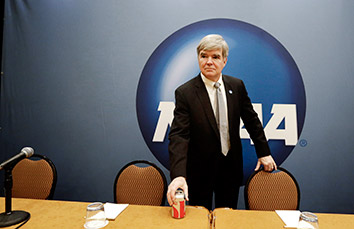Subscriber Benefit
As a subscriber you can listen to articles at work, in the car, or while you work out. Subscribe NowThe Women’s Basketball Coaches Association sent a letter to NCAA President Mark Emmert saying the external review he proposed to look into potential gender equity issues wasn’t good enough.
In the letter, obtained by The Associated Press, the WBCA asked for a “Commission on Gender Inequity in College Sports” led by people chosen by both the WBCA and NCAA. The letter was sent last Thursday, the same day Emmert announced they were hiring a law firm to review potential gender equity issues related to how it conducts its men’s and women’s championship events.
“The issues raised by the treatment of the teams in San Antonio are symptoms of a much larger attitude that women’s sports are second class to their men’s counterparts,” the letter stated.
 Emmert told The Associated Press in an interview last Friday that it was hiring a law firm to review potential gender equity issues in all men’s and women’s championship events, but basketball would be a key focus.
Emmert told The Associated Press in an interview last Friday that it was hiring a law firm to review potential gender equity issues in all men’s and women’s championship events, but basketball would be a key focus.
“We can’t just say we’re in favor of everything being equivalent and fair, we’ve got to make sure that’s actually the case across the board,” Emmert said.
The NCAA has come under fire the past two weeks for glaring differences between the women’s and men’s Division I basketball tournaments. Among other things, female players, coaches and staff in San Antonio have criticized the NCAA for not initially providing a full weight-training area to the women’s teams, noting the men’s teams in Indianapolis did not have the same problem.
WBCA executive director Danielle Donohew said in a video message to the organizations members that they would hold a Zoom call with Division I head coaches, Emmert and the heads of basketball for the NCAA Dan Gavitt and Lynn Holzman to address the conditions in San Antonio on Wednesday morning.
Please enable JavaScript to view this content.


““The issues raised by the treatment of the teams in San Antonio are symptoms of a much larger attitude that women’s sports are second class to their men’s counterparts,” the letter stated.”
But they are second class – in attendance, revenue and athletic ability. So basically they’re asking for subsidies in order to be competitive.
Funny thing is, they are already subsidized by men’s basketball and football, as are all the other athletic programs. Outside of the families of the players and coaches, literally no one else cares even a little about women’s college basketball.
But is that because so much more has historically been invested in men’s sports? Perhaps if equal investment had been made along to attract audience and earn revenue, there wouldn’t be a difference.